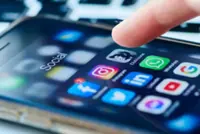An alarming increase of people self-diagnosing mental health conditions has been spurred by online questionnaires and TikTok videos. — Photo by Yuris Alhumaydy on Unsplash
Emily (name changed by request), a 25-year-old Dubai resident, found herself captivated by a TikTok video titled "Signs You Have Bipolar Disorder".
As she watched the video, a profound sense of recognition washed over her. She couldn't help but relate to the symptoms described in the video, feeling as though it was speaking directly to her experiences.





